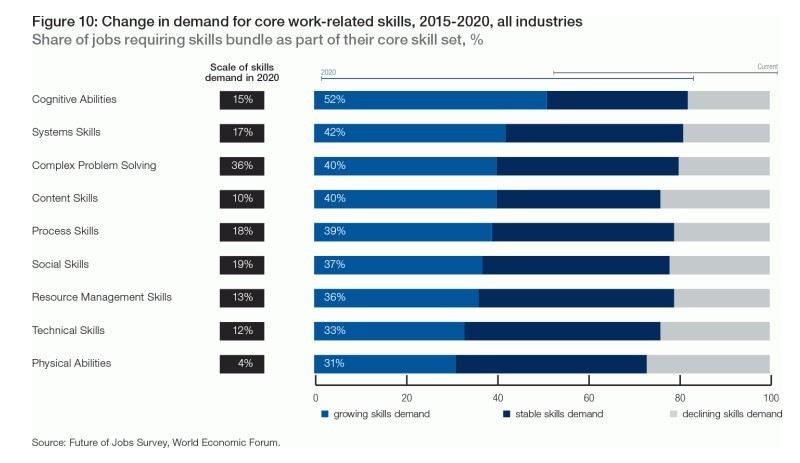Want a job in 2025? These are the sectors to focus on

Five million jobs will soon be lost to automation Image: REUTERS

Get involved with our crowdsourced digital platform to deliver impact at scale
Stay up to date:
Education
Two-thirds of Americans expect that within 50 years, robots and computers will do much of the work humans do now.
And less than five years from now, according to the World Economic Forum’s Future of Jobs report, 5 million jobs will have been lost to automation. But technological advances – in robotics and machine learning, for example – will also create new jobs and change the skills that employers need from human workers.

To compete in the future job market, workers – even those in occupations less directly affected by automation – will need to update their skillsets, the report says.
Here’s a look at a few of the fastest growing occupations identified by the US Bureau of Labor Statistics BLS and the Future of Jobs report, and the skills you’ll need to get them.
- Software developer, computer systems analyst and market-research and marketing specialist jobs are set to grow by around a fifth between now and 2024, according to the BLS. For these jobs, technology and computational thinking skills will be vital.
- Medical technicians, physical therapists, and workplace ergonomics expert jobs are set to see increased demand, as care-giving becomes an increasingly important skill in an ageing society.
- Sales and marketing specialists and customer service representative jobs are also set to grow. Sales-related jobs are one of the top five growth areas, according to the Future of Jobs report. Social and emotional intelligence and understanding new media platforms and how to communicate effectively will be valuable skills, particularly while robots struggle to master them.
- In a fast-changing world, education and training jobs are expected to increase – at number six on the Future of Jobs report list of growth sectors.
- Management analysts, accountants and auditors will see double-digit growth, with adaptability and business acumen being particularly desirable skills for these roles.
By 2020 more than a third of the core skillset of most occupations will be made up of skills that are not considered crucial to the job today, according to the Future of Jobs report.
This table shows which job sectors are likely to see the most "skills instability". For example, 43% of the skills currently needed to perform well in the financial services and investors industry will soon become redundant.

Have you read?
How long will your skills last? Depends on your job
How do you get a job that doesn't exist yet?
Are you ready for the jobs revolution?
You can find more blogs in the Skills for Your Future series here
Further reading
The Future of Jobs report 2016
The Human Capital report 2016
Don't miss any update on this topic
Create a free account and access your personalized content collection with our latest publications and analyses.
License and Republishing
World Economic Forum articles may be republished in accordance with the Creative Commons Attribution-NonCommercial-NoDerivatives 4.0 International Public License, and in accordance with our Terms of Use.
The views expressed in this article are those of the author alone and not the World Economic Forum.
Related topics:
The Agenda Weekly
A weekly update of the most important issues driving the global agenda
You can unsubscribe at any time using the link in our emails. For more details, review our privacy policy.
More on EducationSee all
Natalia Kucirkova
April 17, 2024
Morgan Camp
April 9, 2024
Scott Doughman
March 12, 2024
Genesis Elhussein and Julia Hakspiel
March 1, 2024
Jane Mann
February 28, 2024
Malvika Bhagwat
February 26, 2024






